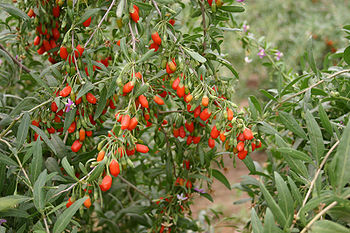See also : Di Gu Pi
Other Names: Lycium, Baies de Goji, Baies de Lycium, Barberry Matrimony Vine, Chinese Boxthorn, Chinese Wolfberry, Di Gu Pi, Digupi, Épine du Christ, Fructus Lychii Chinensis, Fructus Lycii, Fructus Lycii Berry, Fruit de Lycium, Goji, Goji Berry, Goji Chinois, Goji de l’Himalaya, Goji Juice, Gou Qi Zi, Gouqizi, Jus de Goji, Kuko, Lichi, Litchi Chinensis, Licium Barbarum, Litchi, Lychee, Lyciet, Lyciet Commun, Lyciet de Barbarie, Lyciet de Chine, Lycii Berries, Lycii Chinensis, Lycii Fruit, Lycium barbarum, Lycium chinense, Lycium Fruit, Matrimony Vine, Ning Xia Gou Qi, Wolfberry., Gou Qi Zi, Fructus lycii, wolfberries, 枸杞子
Goji berries grow on an evergreen shrub found in temperate and subtropical regions in China, Mongolia and in the Himalayas in Tibet. They are in the nightshade (Solonaceae) family.Goji berries are usually found dried. They are shriveled red berries that look like red raisins.. Goji berries are red and sweet tasting when ready for harvest and when dried look similar in shape and size to dried raisins. The dried berries and root bark are used to make medicine.
Special Precautions of Goji Berry
- should not be consumed if you have diarrhea - they'll make your diarrhea worse. Conversely, goji berries are a good constipation remedy.
- Goji berries may interact with anticoagulant drugs (commonly called "blood-thinners"), such as warfarin (Coumadin®). There was one case report published in the journal Annals of Pharmacotherapy of a 61-year old woman who had an increased risk of bleeding, indicated by an elevated international normalized ratio (INR). She had been drinking 3-4 cups daily of goji berry tea. Her blood work returned to normal after discontinuing the goji berry tea.
- If you have pollen allergies you may want to stay away from this fruit.
- Case reports have linked goji berries consumption with skin photosensitivity, causing a skin rash on exposure to sunlight.
- They are also naturally rich in oxalate which may be a health issue in kidney problems.
The benefits of Goji Berry are
Goji berry benefits are numerous. Goji berries (gou qi zi in Chinese) have been a popular longevity tonic in China for centuries. They are mainly grown in north west China. Goji berries (also called wolfberries) are red and sweet tasting when ready for harvest and when dried look similar in shape and size to dried raisins. Goji berries have a higher antioxidant score than broccoli, grapes and strawberries.They're loaded with antioxidants and carotenoids, and they've literally been used for over 5,000 years to promote stamina and longevity as part of Traditional Chinese Medicine. According to Traditional Chinese Medicine goji berry benefits include:
- Nourish blood
- Kidney & liver tonic
- Improve vision
- Enhance libido
- Calm nervous system
- Improve physical endurance
- strengthen the legs
- Promote longevity
- Goji berries are a traditional Chinese sexual tonic for men and women. Traditionally goji berries are said to increase sexual stamina, nourish semen and promote production of sexual hormones. Often in Chinese medicine they are combined with other herbs like ginseng for greater libido-boosting benefits.
- For constipation, try eating a handful of berries or drinking a cup of goji juice first thing in the morning and again at night before bed.
- Cancer : Used in Fu Zheng Therapy
